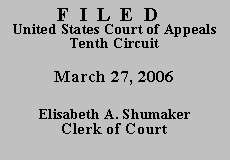

| UNITED STATES OF AMERICA, |
|
| v. | |
| DAVID RAMIREZ-MARIN, also known as Navor Ramirez-Garcia, |
On May 31, 2005, the district court sentenced Mr. Ramirez-Marin to 81 months' imprisonment, followed by three years of supervised release. He now appeals the sentence, arguing that his prior aggravated-felony conviction should have been alleged in the indictment and proved to the jury beyond a reasonable doubt. We have jurisdiction under 18 U.S.C. § 3742(a) and 28 U.S.C. § 1291, and affirm.
Section § 1326 provides, in relevant part:
Reentry of removed aliens
(a) In general
Subject to subsection (b) of this section, any alien who--
(1) has been denied admission, excluded, deported, or removed or has departed the United States while an order of exclusion, deportation, or removal is outstanding, and thereafter
(2) enters, attempts to enter, or is at any time found in, the United States . . .
shall be fined under Title 18, or imprisoned not more than 2 years or both.
(b) Criminal penalties for reentry of certain removed aliens
Notwithstanding subsection (a) of this section, in the case of any alien described in such subsection--
. . .
(2) whose removal was subsequent to a conviction for commission of an aggravated felony, such alien shall be fined under such Title, imprisoned not more than 20 years, or both;
. . . .
Mr. Ramirez-Marin raises for the first time on appeal a challenge to the failure of the indictment to allege the prior conviction that authorizes a sentence up to 20 years under § 1326(b). He contends that the absence of that allegation in the indictment means that he was charged only with a violation of § 1326(a) and cannot be sentenced to more than two years' imprisonment. As a result, he argues, the district court lacked jurisdiction to sentence him under § 1326(b) and, in the alternative, committed plain error by doing so.
As Mr. Ramirez-Marin acknowledges, however, his contentions are barred by controlling precedent. In Almendarez-Torres v. United States, 523 U.S. 224, 235 (1998), the Supreme Court held that § 1326(b)(2) merely creates a sentencing factor that need not be alleged in the indictment. That holding was questioned but left intact by the Supreme Court's decision in Apprendi v. New Jersey, 530 U.S. 466, 489-90 (2000). Believing that Almendarez-Torres was incorrectly decided and should be overruled, Mr. Ramirez-Marin raises the issue to preserve it for Supreme Court review. In the meantime, however, we are bound by Supreme Court precedent. See Agostini v. Felton, 521 U.S. 203, 237 (1997) ("[I]f a precedent of this Court has direct application in a case, yet appears to rest on reasons rejected in some other line of decisions, the Court of Appeals should follow the case which directly controls, leaving to this Court the prerogative of overruling its own decisions." (internal quotation marks omitted)). Accordingly, we AFFIRM the sentence imposed by the district court.
ENTERED FOR THE COURT
Harris L Hartz
Circuit Judge
*.After examining the briefs and appellate record, this panel has determined unanimously to honor the parties' request for a decision on the briefs without oral argument. See Fed. R. App. P. 34(f); 10th Cir. R. 34.1(G). The case is therefore ordered submitted without oral argument. This order and judgment is not binding precedent, except under the doctrines of law of the case, res judicata, and collateral estoppel. The court generally disfavors the citation of orders and judgments; nevertheless, an order and judgment may be cited under the terms and conditions of 10th Cir. R. 36.3.